IT-FR cooperation in Heritage Science
Human-centered approach for cultural heritage in green transition
Disciplines talking to each other
January 27th 2023 | Hybrid Event
In person: Paris, French ministry of Culture | H 9.30 - 13:00
Online: Teams platform | H 10:00 - 13:00
Within the framework of the Italian-French bilateral cooperation in Heritage Science, participate to the third hybrid event of a series of sessions on the Cultural Heritage in the Green transition issue!
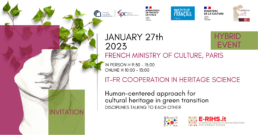
The third hybrid event will take place in Paris at the French ministry of Culture (182, Rue Saint-Honoré, 75001, Paris) and online on Teams on January the 27th from 10:00am to 1:00pm. For those wishing to attend the meeting in person, the Salle Molière of the ministry of Culture will be open from 9:30am for a welcome coffee.
The workshop will be a sequel to a debate. It is part of the Franco-Italian bilateral cooperation on heritage science which is based on the recognized excellence of the two countries on several long-term joint research initiatives.
The event will also be the occasion for the JPI CH and the JPI Climate to talk about their initiatives and respective missions.
The organisation of the event has been coordinated by the Istituto di Scienze del Patrimonio Culturale del Consiglio Nazionale delle Ricerche, the French ministry of Culture, the Fondation des Sciences du Patrimoines, the Institut Français Italia, and the French Embassy in Italy.
With this series of exchanges, the above mentioned institutions aim to consolidate ties between the two countries, strengthening relations between Italian and French research on cultural heritage and creating a perfect cooperation dynamic.
The online event will be held in English
Registration for the event is still open and mandatory
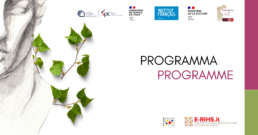
Presentations by speakers at the event are available here
Cultural Heritage facing Climate Change
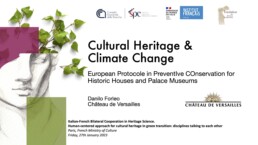
Cultural Heritage & Clima Change: European protocol in preventive conservation for historic houses and palace museums
Since 2015, the Palace of Versailles has led the EPICO (European Protocol In preventive Conservation) research programme, focused on the preventive conservation of historic houses and palace–museums. Alongside the Network of European Royal Residences (ARRE), the EPV partners with different members of ARRE as well as international research and educational institutes. Within the framework of sound, sustainable management, EPICO has continued its preventive approach by developing an assessment method collections, designed specifically for historic houses. A sustainable management strategy based on preventive conservation requires precise knowledge of the state and conservation conditions of collections. An action plan can then be drawn up to establish preventive and maintenance priorities that aim to limit the amount of restoration required; this will have a significant beneficial impact on environmental and economic management of resources. This method can be applied to any historic house, regardless of its size or the number of collections it conserves. Using simple tools the EPICO method aims to provide a full overview of the condition of the building to establish priorities and draw up a long-term strategy. This is based on a systemic assessment strategy in which the conditions of conservation, the state of conservation of the collection and the presentation of the works are analysed.
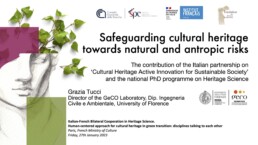
Safeguarding cultural heritage against natural and anthropic risks.
The contribution of the Italian partnership on ‘Cultural Heritage Active Innovation for Sustainable Society’ and the national PhD programme on Heritage Sciences
The speech illustrates the Italian contribution in the field of research on cultural heritage, with particular reference to the built heritage, in relation to the causes and effects of climate change. Brief references to national and European regulations will introduce the NRRP (National Recovery and Resilience Plan) Extended Partnership Programme, followed by an illustration of the objectives and methods of the new national PhD programme “Heritage Science”, also created with NRRP resources, with the aim of training a new generation of researchers and professionals working in the cultural heritage sector, capable of collaborating and competing in the context of the most prestigious European and international initiatives.
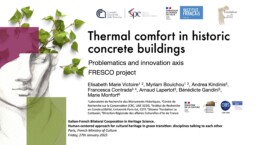
FRESCO: Thermal comfort in historic concrete buildings
Problematics and innovation axis
Since the 1990s, the amount of concrete buildings protected as historical monuments in France exponentially grew to reach in 2021 more than 920 buildings. If concrete has allowed many architectural innovations, of which the work of Le Corbusier is one of the major emblems, it has also generated new problems. Thus, the desire to refine the walls to create an architectural lightness, the large openings according to the concept of the free plan created by Le Corbusier in the 1920s, are first a source of thermal discomfort. Additionally, concrete pathologies, often related to condensation phenomena, are observed. The current global warming, confirmed by the IPCC report (IPCC_AR6_WGII, Chapter06) will contribute to accentuate these problems, and make it urgent to find new ways of resilience.
If solutions such as thermal insulation from the outside have proven their worth, they are difficult to transpose to historic monuments which restoration ethics require the preservation of the architectural aspect and the material. Research of innovative technological solutions and management of the use are thus necessary.
In this context, the FRESCO project, supported by the COMUE Paris-Est aims to find innovative solutions to improve thermal comfort, energy efficiency and material conservation in historic concrete buildings, while respecting their deontological requirements. The project, whose novelty lies in the systemic vision of the behavior of 20th century heritage buildings, is focusing on three famous examples of the architecture of Le Corbusier.
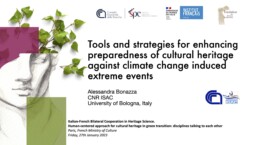
Tools and strategies for enhancing preparedness of cultural heritage against climate change-induced extreme events
The risk to cultural heritage as a consequence of the related hazards and impacts of climate change, particularly extreme events, is globally recognized. However, this is not sufficiently addressed by research-based measures dedicated to its safeguarding, nor is it properly set out in national disaster risk-reduction and management plans and measures.
Research and innovation on user-driven solutions, tools, mitigation and adaptation strategies, is therefore urgently required, based on sound scientific studies, capitalization of achieved knowledge, transferring and dissemination of results and coordinated actions among the different actors involved in the decision-making process for protection and management of cultural and natural heritage. Recent results obtained at European level are discussed by focusing in particular on the “Risk mapping tool for cultural heritage protection” and the “Methodology for vulnerability ranking” developed in the framework of the Interreg Central European Projects ProteCHt2save and STRENCH. Strategies proposed for the safeguarding of cultural heritage in line with the Sendai Framework for Disaster Risk Reduction (2015-2030) within the EU Study “Safeguarding Cultural Heritage from Natural and Man-Made Disasters” are also presented.
Built Heritage and Environment
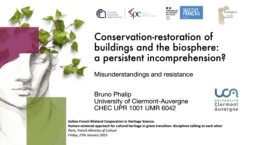
Conservation-restoration of buildings and the biosphere: a persistent incomprehension?
Misunderstandings and resistance
A profound change in our ways of thinking and acting? For several years, the multiplication of editorial initiatives, research, conferences and meetings, and public demands, seem to be moving in the direction of a slow but sure integration of environmental issues related to monuments and sites.
Nevertheless, despite the displays, various arguments are formulated that lessen the impact of the wishes expressed to work differently. Resistance and contradictions betray the weight of habits, the lack of human and material means in the services, the absence of adapted training, as well as the difficulties to question theories and practices, affect the different actors, institutions or companies.
It is a fact that, despite some good attempts and experiments, the exception is the rule. The latter hardly questions the usual practices with immediate value, the interventionist policies, the techniques used (destructive, abrasive, mechanical…), the products (biocides, waterproofing agents, hardeners, additives…), and the resulting waste; all this contributes to distancing the intentions of a balance between monument, site and environmental protection.
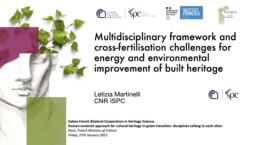
Multidisciplinary framework and cross-fertilisation challenges for energy and environmental improvement of built heritage
Built heritage is being recognised as a driver for sustainable development and green transition, as shown by the recent actions of the Climate Heritage Network, with the development of the European Cultural Heritage Green Paper in response to the European Green Deal. Environmental design and built heritage science are undergoing an integrated and interdisciplinary cross-fertilisation, capable of leveraging the best of both hard sciences and humanities, to face the challenges of the energy and environmental improvement of historical buildings. To this end, Heritage Building Information Modelling (HBIM) and Building Performance Simulation (BPS) are promising tools to tackle the heterogeneity and complexities of built heritage, even if interoperability between the two is still complex. HBIM is an information management tool to structure the improvement workflow, while BPS can identify and simulate the energy behaviour of the building’s current state and evaluate the proposed interventions. The application of a workflow based on these tools to Palazzo Maffei Borghese, a historical building in the city centre of Rome, proves their effectiveness for research and professional practice.
Further information
The event is third of a series of seminars. The first one was held in Rome on September the 15th 2022 and the second one held online on November the 10th. For further information about previous events, we invite you to visit the pages dedicated to the Italian-French partnership for heritage science.
